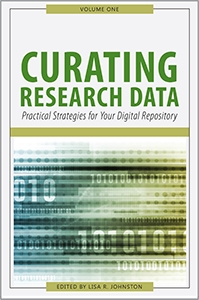Primary tabs
You don't need to be an ALA Member to purchase from the ALA Store, but you'll be asked to create an online account/profile during the checkout to proceed. This Web Account is for both Members and non-Members.
If you are Tax-Exempt, please verify that your account is currently set up as exempt before placing your order, as our new fulfillment center will need current documentation. Learn how to verify here.
- Description
- Table of Contents
- About the author
Data are becoming the proverbial coin of the digital realm: a research commodity that might purchase reputation credit in a disciplinary culture of data sharing, or buy transparency when faced with funding agency mandates or publisher scrutiny. Unlike most monetary systems, however, digital data can flow in all too great an abundance. Not only does this currency actually "grow" on trees, but it comes from animals, books, thoughts, and each of us! And that is what makes data curation so essential. The abundance of digital research data challenges library and information science professionals to harness this flow of information streaming from research discovery and scholarly pursuit and preserve the unique evidence for future use.
Volume One of Curating Research Data explores the variety of reasons, motivations, and drivers for why data curation services are needed in the context of academic and disciplinary data repository efforts. Twelve chapters, divided into three parts, take an in-depth look at the complex practice of data curation as it emerges around us. Part I sets the stage for data curation by describing current policies, data sharing cultures, and collaborative efforts currently underway that impact potential services. Part II brings several key issues, such as cost recovery and marketing strategy, into focus for practitioners when considering how to put data curation services in action. Finally, Part III describes the full lifecycle of data by examining the ethical and practical reuse issues that data curation practitioners must consider as we strive to prepare data for the future.
Digital data is ubiquitous and rapidly reshaping how scholarship progresses now and into the future. The information expertise of librarians can help ensure the resiliency of digital data, and the information it represents, by addressing how the meaning, integrity, and provenance of digital data generated by researchers today will be captured and conveyed to future researchers.
Introduction to Data Curation
Lisa R. Johnston
Part I. Setting the Stage for Data Curation. Policies, Culture, and Collaboration
Chapter 1. Research and the Changing Nature of Data Repositories
Karen S. Baker and Ruth E. Duerr
Chapter 2. Institutional, Funder, and Journal Data Policies
Kristin Briney, Abigail Goben, and Lisa Zilinski
Chapter 3. Collaborative Research Data Curation Services: A View from Canada
Eugene Barsky, Larry Laliberté, Amber Leahey, and Leanne Trimble
Chapter 4. Practices Do Not Make Perfect: Disciplinary Data Sharing and Reuse Practices and Their Implications for Repository Data Curation
Ixchel M. Faniel and Elizabeth Yakel
Chapter 5. Overlooked and Overrated Data Sharing: Why Some Scientists Are Confused and/or Dismissive
Heidi J. Imker
Part II. Data Curation Services in Action
Chapter 6. Research Data Services Maturity in Academic Libraries
Inna Kouper, Kathleen Fear, Mayu Ishida, Christine Kollen, and Sarah C. Williams
Chapter 7. Extending Data Curation Service Models for Academic Library and Institutional Repositories
Jon Wheeler
Chapter 8. Beyond Cost Recovery: Revenue Models and Practices for Data Repositories in Academia
Karl Nilsen
Chapter 9. Current Outreach and Marketing Practices for Research Data Repositories
Katherine J. Gerwig
Part III. Preparing Data for the Future. Ethical and Appropriate Reuse of Data
Chapter 10. Open Exit: Reaching the End of the Data Life Cycle
Andrea Ogier, Natsuko Nicholls, and Ryan Speer
Chapter 11. The Current State of Meta-Repositories for Data
Cynthia R. Hudson Vitale
Chapter 12. Curation of Scientific Data at Risk of Loss: Data Rescue and Dissemination
Robert R. Downs and Robert S. Chen
Contributor Biographies
Lisa R. Johnston
Lisa R. Johnston is an Associate Librarian at the University of Minnesota, Twin Cities. Johnston serves as the libraries’ Research Data Management/Curation Lead and as Co-Director of the University Digital Conservancy, the University of Minnesota’s institutional repository. In 2014, Johnston led the team that developed and launched the Data Repository for the University of Minnesota (DRUM), http://hdl.handle.net/11299/166578. She serves as principal investigator of the multi-institution collaboration, the Data Curation Network project, which launched in 2016 with funding from the Alfred P. Sloan Foundation. Johnston has presented internationally on topics of academic library services for research data management, authored research articles on data management topics, and co-edited the book Data Information Literacy: Librarians, Data, and the Education of a New Generation of Researchers (Purdue University Press, eds. Carlson and Johnston, 2015), which details a variety of educational approaches used in data management training for STEM graduate students. Prior to becoming a librarian, Johnston was a science writer and assistant editor for Sky & Telescope magazine. Johnston holds a master of library science and bachelor of science in astrophysics, both from Indiana University, and was certified by the Society of American Archivists as a Digital Curation Specialist. Her ORCID is http://orcid.org/0000-0001-6908-9240.



